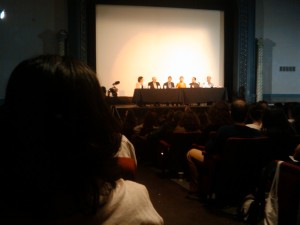My wife and I went along to a local San Franciso screening of Fresh a couple of weeks ago. It’s a documentary film by Ana Sofia Joanes about the Fresh food movement – locally grown and harvested food (pic is my abysmal attempt to document the occasion with a cell phone camera).
 My wife has become very involved with the Fresh, locally grown food movement out here on the West coast. So naturally, by osmosis, so have I. Well, to the extent that I eat everything she buys. If truth be told though, I generally enjoy fresh, locally grown food a lot more than supermarket fare nowadays.
My wife has become very involved with the Fresh, locally grown food movement out here on the West coast. So naturally, by osmosis, so have I. Well, to the extent that I eat everything she buys. If truth be told though, I generally enjoy fresh, locally grown food a lot more than supermarket fare nowadays.
The screening of this movie was the first time I’d really seen a collection of Fresh ‘foodies’ all in one location. A real eclectic bunch – everyone from your ‘farmer Joe” types to hip urban chic.
The screening was MC’d by a local food entrepreneur who is opening a ‘locally grown’ community restaurant in Berkeley. He introduced the movie and filmmaker and also chaired the post screening panel.
The panel was an impressive mix of ‘fooderati’ with the main attraction being Michael Pollan, the author of The Omnivore’s Dilemma and In Defence of Food. The Omnivore’s Dilemma is a great read and I would recommend it to anyone. It was also, loosely, the basis for Fresh, the movie.
The whole ‘locally grown’ movement is a complicated one with many different strands. At its heart though is the notion that you can’t build a sustainable food system based on the principles of the industrial revolution. Economies of scale work for widgets, but not for tomatoes, or chickens, or beef, or fish. As soon as you try to ‘manufacture’ these, you have to homogenize inputs and processes to such an extent that any components of the natural system Mother Nature perfected over millennia disappear.
That natural system is based on carefully calibrated feedback loops and symbiotic relationships. Not the sort of things you find in chicken farms – where thousands of birds are kept alive through a combination of cruel mutilation and drugs.
The result, as Michael Pollan likes to say, is ‘there is no cheap food’. To industrialize the food process means to introduce foreign agents (like antibiotics) to keep costs down and output high. This results in lower and lower supermarket prices, but higher health costs as we all cope with diseases that were largely non-existent 100 years ago (heart disease, diabetes, cancer, etc.).
I never really gave much thought to this until my wife (bless her) told me to look closely at the ingredients of the peanut butter I was eating. As I was reading out the 20 different chemicals listed on the back, she told me that peanut butter is made from crushing peanuts and adding a bit of salt – why would you need anything else? She was right. The added ingredients are to make it taste a certain way and to keep you coming back for more. Also to make it last longer on the shelf.
If you look at the vast majority of other processed foods, it’s the same story. We’ve sacrificed natural form for convenience and taste. And in the process, made huge sacrifices in our health. Fixable, of course, by the benevolent pharmaceutical companies who have a pill for every condition (ok, that’s stretching the conspiracy side of the argument a bit, but it’s hard to ignore the modern trend of food that makes you sick and pills to fix the problem).
As I was sitting in the theatre and taking all of this in, it struck me what exactly this locally grown food movement is up against. The combined might of industrial agriculture, big retail, and the drug companies. That’s a pretty formidable set of opponents.
And the battle isn’t only over facts and figures, it’s to capture hearts and minds. There is a long legacy of industrial food consumption in the US. Long and treasured. With some of the most cherished brands selling promises of homely goodness and holiday fun packaged in dangerous foods – Oreo Cookies, hotdogs, McDonald’s hamburgers, etc.
To destroy 50 to 70 years of brand equity is hard to do. I don’t envy the their task. But to win this battle, destroy it they must.
I’ve personally discovered that you can’t get half pregnant in this debate. As you move your diet away from processed foods and wean yourself off junk, you can’t easily go back. You body ends up rejecting the chemical tastes. Your taste’s change entirely. The thought of McDOnald’s, once the staple of my Friday nights, now makes me physically ill.
The locally grown food movement is drawing the battle lines for the next big conflict in corporate America – and this time it’s not just one industry in the firing line (as was the case with Tobacco), it’s multiple industries. All supporting and sustaining the unsustainable industrial food chain.
So grab a chair, a bucket of locally grown organic popcorn, and watch the ride. It will be an interesting one.
One Response to “Fresh The Movie, and the struggle ahead”